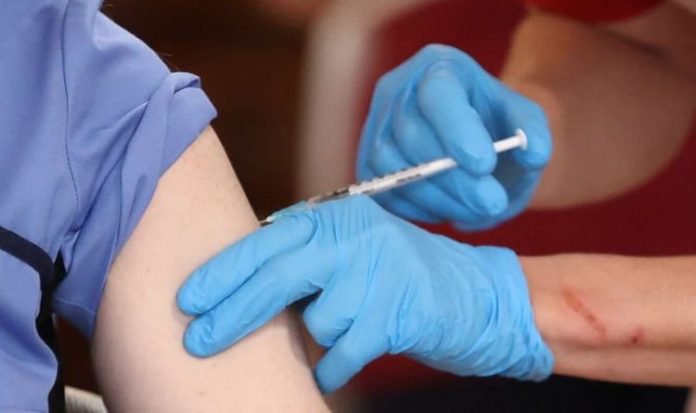Coronavirus vaccine ‘needs to be taken’ says Charlie Mullins
Dr Anthony Harnden, GP and deputy chair of the Joint Committee on Vaccination and Immunisation (JCVI), says thorough scrutiny of the vaccine shows it is “safe and effective”. He spoke during an historic week as the UK began its rollout of the Pfizer/BioNTech vaccine.
Margaret Keenan, 90, became the first person in the world to receive the jab as part of a mass vaccination programme.
A total of 800,000 doses of the Pfizer/BioNTech vaccine will be dispensed in the coming weeks, with up to four million more expected by the end of the month.
It is a moment of great optimism in the global battle against coronavirus, which Dr Harnden told Express.co.uk: “We should be celebrating”.
He responded to a new study suggesting hesitation towards the vaccine could be a “major looming problem”.
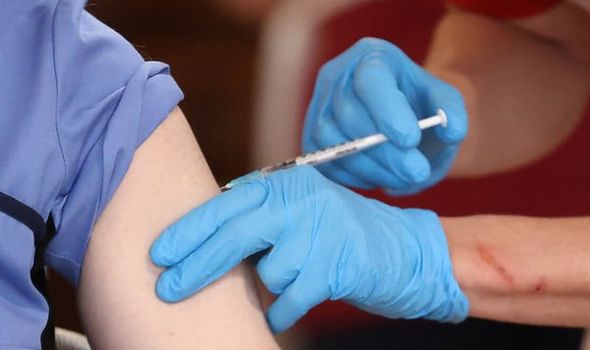
Care home staff receive the Pfizer/BioNtech covid-19 vaccine in Belfast (Image: Liam McBurney/PA Wire/PA Images)
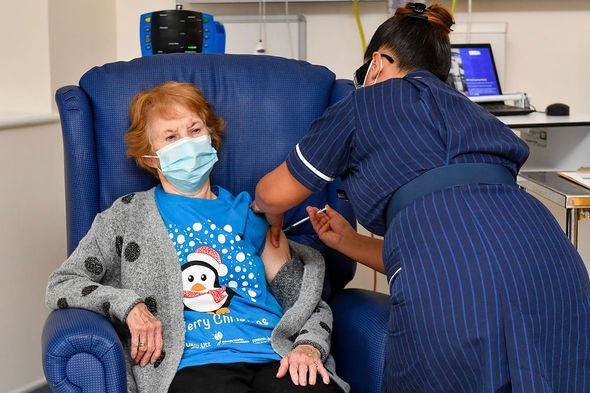
Margaret Keenan, 90, is the first patient to receive the Pfizer/BioNtech vaccine (Image: Getty)
Dr Harnden said: “The safety and effectiveness trial data set has been carefully scrutinised by the regulator, the MHRA (Medicines and Healthcare products Regulatory Agency), and reviewed by the JCVI.
“Both independent bodies have concluded that the current evidence shows the vaccine is safe and effective, but will be clearly monitoring any new safety concerns as the vaccine is rolled out.
“Covid is a terrible infectious disease afflicting the whole world.
“We should be celebrating the first opportunity to have a vaccine to prevent this infection and taking it up as soon as we are offered.
READ MORE: Covid vaccine: Britons to get vaccinated by ‘end of winter’ – expert

A person wearing a protective face mask walks past the Pfizer Inc. headquarters, New York (Image: Getty)
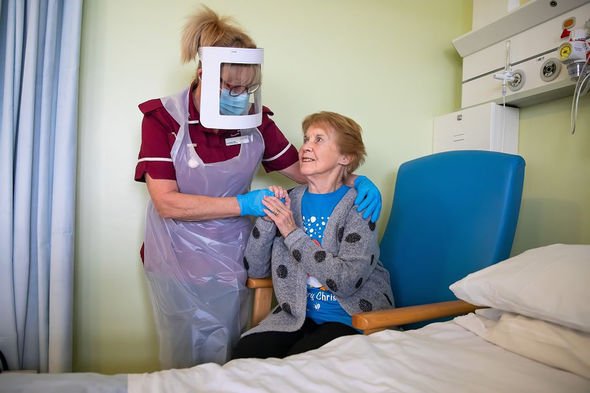
Margaret Keenan, 90, the first patient in the United Kingdom to receive the Pfizer/BioNtech vaccine (Image: Getty)
“We owe it to ourselves, our family and friends and the wider society. Let’s fight this together.”
An October 2020 paper by The University of British Columbia and University of Regina raised concerns about vaccine hesitancy.
The paper is titled A Proactive Approach for Managing COVID-19: The Importance of Understanding the Motivational Roots of Vaccination Hesitancy for SARS-CoV2.
It found: “Vaccination hesitancy is a major looming problem for COVID-19.
“To improve vaccine uptake, it is imperative that the vaccine is demonstrated to the public to be rigorously tested and not perceived as rushed or premature in its dissemination.”
DON’T MISS:
Grandad Martin Kenyon brilliant hilarious quip at Piers Morgan [LATEST]
Chris Whitty warns coronavirus vaccination might be needed ‘annually’ [REVEAL]
Chief scientific adviser says face masks may be needed until next year [INSIGHT]
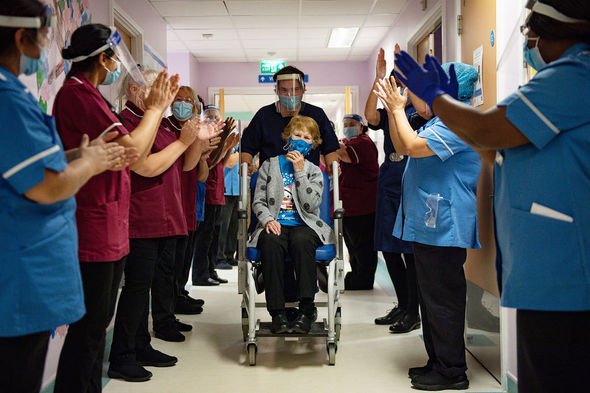
Margaret Keenan, 90, is applauded by staff as she returns to her ward (Image: Getty)
The research studied 3,674 American and Canadian adults in May 2020.
Twenty five percent of American respondents and 20 percent of Canadian respondents said they would not get immunised if a vaccine was available.
One of the researchers, Dr Steven Taylor, professor and clinical psychologist at the University of British Columbia, told Express.co.uk “pre-COVID anti-vax attitudes” and concerns “the vaccination development process has been rushed” were key issues.
The World Health Organisation (WHO) has cited vaccine hesitancy – reluctance or refusal to be vaccinated – as a leading global health threat.
Prof Jennifer Rogers, vice president at the Royal Statistical Society, explained the rigorous testing the vaccine has undergone.
When asked if any shortcuts had been taken, she told ITV: “Absolutely not.”
She said: “When clinical trials are designed, sample size calculations are carried out to make sure that enough people are included to be able to reliably say whether a new vaccine works.
“The Covid-19 vaccine trials have been no exception.
“Pfizer and BioNTech calculated that if they saw a vaccine effectiveness of at least 50 percent on 164 Covid-19 cases, that would be enough evidence to say that their vaccine worked.
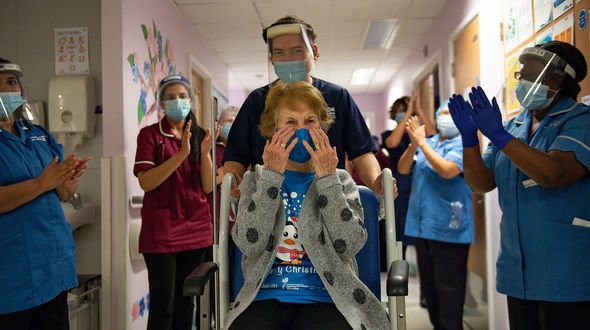
Margaret Keenan, 90, is applauded by staff as she returns to her ward (Image: Getty)
“What they saw was a vaccine effectiveness of over 95 percent on 170 cases.
“So, they definitely have enough evidence to say that this vaccine works.
“No vaccine will ever be 100 percent effective and even the flu vaccine averages a vaccine effectiveness of 40 percent to 60 percent, according to the Centers for Disease Control and Prevention.
“A 95 percent effectiveness is excellent.”
A spokesperson for WHO said: “Misinformation about future COVID-19 vaccines is already circulating, and there’s a possibility that this might impact the acceptance and uptake of these vaccines.
“However, WHO are quite confident that once we are closer to availability of safe and effective COVID-19 vaccines, we would expect a lot of positive sentiment towards vaccination, especially given the protection and return to normal life they could represent.
“Vaccines are a global public good. This is because we benefit if others are vaccinated. It is in all countries’ interest that the vaccine is made available across the world. There will be no true global (including economic) recovery unless all parts of the world are able to bring transmission under control.”
